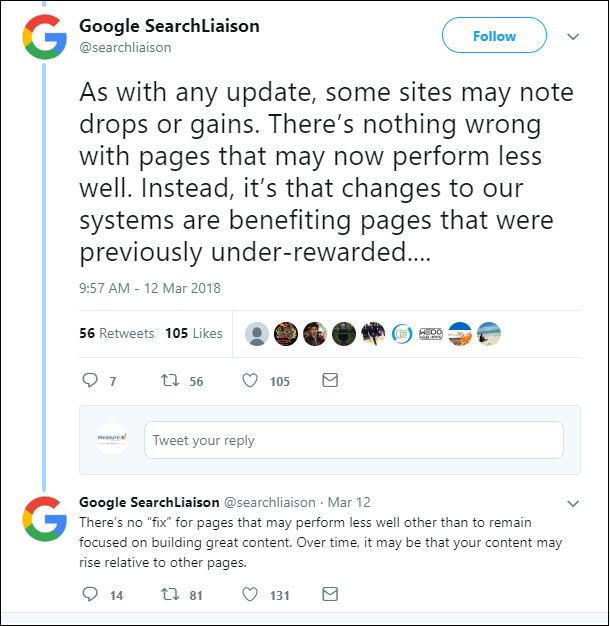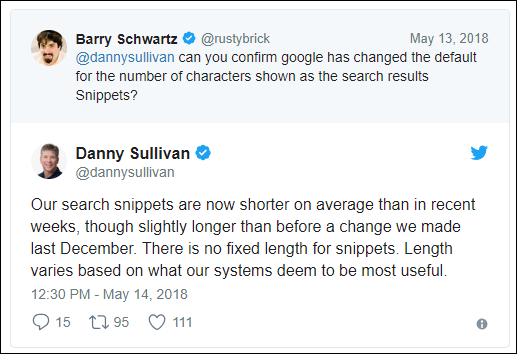It’s every business owner’s dream to be ranked on the first page of Google or even in the #1 spot. In the digital age, if your business doesn’t appear on Google, a large percentage of consumers won’t even know you exist. As the top search engine in the world, Google and its search algorithms have the power to make or break your business. This is why it’s critical to stay up-to-date with every update and change that Google makes to ensure that your business continues to rank and be seen by people searching for products/services like yours.
Google recently made a significant change to their core algorithm that recognizes quality content and pages. They announced a global algorithm update in March 2018, which meant that every site would be impacted. This caused concern for some SEO experts, who saw competitors ranking higher while their clients content started ranking lower.
It’s important to note that Google addressed the core algorithm change by saying that the update was focused on rewarding pages that weren’t being adequately recognized by their previous algorithm. The reason some pages were ranking lower wasn’t because they were now being seen as poor quality, but because there was now more competition for the top spot. And accordingly, poor quality pages were now ranking lower.

In July 2018, Google announced another algorithm update geared towards measuring the speed and responsiveness of mobile websites. Dubbed the Google Speed Update, it adds a site’s loading speed on mobile as a key ranking factor. As mobile search continues to grow in popularity, it’s critical that consumers can quickly access the information they need when using their smartphone or tablet. The new Google Speed Update will direct mobile searchers towards websites that load quickly on their devices, which highlights the importance of ensuring that your website is responsive and mobile friendly.
Has Google’s Algorithm Update Affected Your Site’s Rankings? Then Follow These Steps
So what should you do to ensure that your website isn’t negatively impacted by Google’s latest algorithm updates, so you can maintain (or improve!) your rankings?
Conduct a website audit
If your website has technical issues, such as slow loading times, broken links, or redirect loops, visitors will click away from your site. In a crowded marketplace, consumers demand speedy and efficient websites, and if they can’t quickly find what they’re looking for, they’ll click off your site and visit a competitor. Google recognizes this consumer behaviour and consequently gives preference to sites that work well, have no technical difficulties, and load quickly.
Learn from Google’s Search Quality Raters Guidelines
Google provides a lengthy and comprehensive guideline to help website owners and SEO experts understand what Google considers quality content. Be forewarned that the guideline is over 160 pages, however, it is worth taking the time to read it. These guidelines will teach you how Google’s Quality Raters identify quality content. If your business has issues with Expertise, Authority, and Trust (E-A-T), Google’s guidelines can also help you.
Conduct competitor website comparisons & consider how easy your website is to use
As word spreads about Google’s latest changes, your competitors will take all updates just as seriously as you do. Compare your digital presence to your closest competitor’s and look for areas of improvement. Have a close colleague proofread your web content and analyze your site’s ease of use. Make note of their feedback and consider how you can implement any updates. You may want to hire a new a web designer to make your site more conversion friendly and update your site’s content.
Remove redundant & repetitive content
After Google’s algorithm update, it will be easier for your website to lose its ranking if you don’t take action. Low quality content will negatively affect your ranking, as your competitors content will surpass yours. An easy way to improve your content is to remove repetitive content, as Google will consider it redundant. You can also look at the style and type of content featured on high ranking websites, and mimic that style for your own content.
Remove intrusive ads
While online ads are an effective way to boost income, visitors to your site will not appreciate ads that disrupt their user experience. Intrusive ads that play sound, take up the whole screen, pop-up at inopportune times, are too flashy, and perhaps even offensive will make visitors click off your site immediately. If you notice your site features intrusive ads, review your Google Adsense account to block certain ads.
Continually add fresh content
To maintain or increase your website’s ranking, you must regularly add new and keyword-rich content to your website. However, your new content shouldn’t focus only on SEO; it must be educational and informative to be considered high-quality. Adding media to your content, such as videos, will also help your content rank higher. To master the art of merging SEO with content writing, check out our other blog that explains how to write quality content.
Has Your Google Snippet Changed, Too? Make Sure Your Snippet Encourages Clicks
If you’re unfamiliar with snippets, these are the descriptions that accompany search results, and give searchers an idea about the information a website contains.

Google has made several changes to its snippet display over the past year (and given marketers a few headaches in the process!). In December 2017, Google increased the character limit of the snippets, only to decrease the average length five months later. While some SEO experts rushed to re-optimize and increase the length of their meta descriptions after the December update, Google now dynamically pulls the snippet text from your website. This means the length will vary and meta descriptions don’t factor into your site’s snippet on Google. To counter this and ensure that your site’s snippet entices searchers to click, consider the structure of your SEO content. If your keyword strategy involves stuffing your keywords into lists or chunks of text, rather than sharing information, you won’t have a quality snippet. If you have a poor quality snippet that doesn’t attract clicks, Google will notice that fewer people are clicking on your site compared to a competitor’s site, and this will negatively affect your ranking. However, structuring your content so that your keywords appear organically while providing valuable information will allow Google to pull a quality snippet from your website.

Many websites aim to have a rich or featured snippet, meaning their snippet will display more valuable information and perhaps a thumbnail image. Rich snippets have been shown to improve the click-through rate, which will increase your site’s organic traffic. However, according to recent studies, featured snippets rank in the top 10 on Google for the related keyword. This means that if you want the opportunity to appear as a featured snippet, you need to carefully manage your SEO strategy and continually produce quality SEO content that keeps you in top 10 for your designated keywords.
Need Help Managing Your Site’s SEO Strategy To Keep Up With Google’s Updates?
Google is constantly evolving their search engine to keep up with consumer expectations, and to provide better and more efficient search results. While the updates benefit consumers by improving their search experience, it can be hard for businesses to keep up and ensure that their rankings don’t suffer.
To stay up-to-date with Google’s latest updates, you need to work with a digital marketing agency that has a team of SEO experts who make it their job to know Google inside-and-out. At Measure Marketing, our SEO experts can help you develop local search, paid ads, and content marketing strategies that will increase your keyword rankings and help you get noticed by your target audience. The result? You’ll generate more leads, increase sales, and enjoy greater brand awareness.
What are you waiting for? Contact Measure Marketing today for a complimentary consultation and learn how we can help your business thrive using our innovative digital marketing strategies. We can’t wait to help you fuel your marketing and get results you can measure.